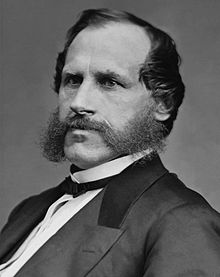George Williams | |
|---|---|
 | |
| 34th Mayor of Portland | |
| In office June 2, 1902 – June 2, 1905 | |
| Preceded by | Henry Rowe |
| Succeeded by | Harry Lane |
| 32nd United States Attorney General | |
| In office December 14, 1871 – April 25, 1875 | |
| President | Ulysses Grant |
| Preceded by | Amos Akerman |
| Succeeded by | Edwards Pierrepont |
| United States Senator from Oregon | |
| In office March 4, 1865 – March 3, 1871 | |
| Preceded by | Benjamin Harding |
| Succeeded by | James Kelly |
| 3rd Chief Justice of the Oregon Supreme Court | |
| In office 1853–1858 | |
| Appointed by | Franklin Pierce |
| Preceded by | Thomas Nelson |
| Succeeded by | Aaron Waite |
| Personal details | |
| Born | March 26, 1823 New Lebanon, New York, U.S. |
| Died | April 4, 1910 (aged 87) Portland, Oregon, U.S. |
| Political party | Democratic (Before 1864) Republican (1864–1910) |
| Spouse(s) | Kate Van Antwerp Kate Hughes George |
| Signature | |
George Henry Williams (March 26, 1823 – April 4, 1910) was an American judge and politician. He served as chief justice of the Oregon Supreme Court, was the 32nd Attorney General of the United States, and was elected Oregon's U.S. senator, and served one term. Williams, as U.S. senator, authored and supported legislation that allowed the U.S. military to be deployed in Reconstruction of the southern states to allow for an orderly process of re-admittance into the United States. Williams was the first presidential Cabinet member to be appointed from the Pacific Coast. As attorney general under President Ulysses S. Grant, Williams continued the prosecutions that shut down the Ku Klux Klan. He had to contend with controversial election disputes in Reconstructed southern states. President Grant and Williams legally recognized P. B. S. Pinchback as the first African American state governor. Williams ruled that the Virginius, a gun-running ship delivering men and munitions to Cuban revolutionaries, which was captured by Spain during the Virginius Affair, did not have the right to bear the U.S. flag. However, he also argued that Spain did not have the right to execute American crew members. Nominated for Supreme Court Chief Justice by President Grant, Williams failed to be confirmed by the U.S. Senate primarily due to Williams's opposition to U.S. Attorney A. C. Gibbs, his former law partner, who refused to stop investigating Republican fraud in the special congressional election that resulted in a victory for Democrat James Nesmith.[1]
In 1875, Williams resigned as U.S. Attorney General after his wife was accused of taking bribes from the custom house firm Pratt & Boyd, which attempted to persuade the U.S. Justice Department to drop litigation against the company. After his resignation, Williams took part in the effort to count Florida ballots for Rutherford B. Hayes during the controversial presidential election of 1876. Williams returned to Oregon, resumed private law practice, and was elected Portland's mayor, serving two terms from 1902 to 1905. Williams, at the age of 83, was indicted for not enforcing restrictions on gambling; he was acquitted and served out the rest of his term as mayor.
- ^ Dumas Malone, ed. (1936). "Williams George Henry". Dictionary of American Biography. New York: Charles Scribner's Sons. pp. 262–263. LCCN 44041895. Retrieved January 16, 2015.